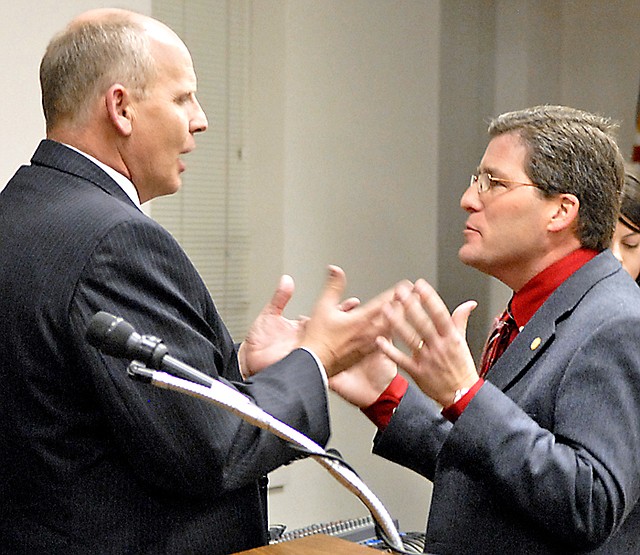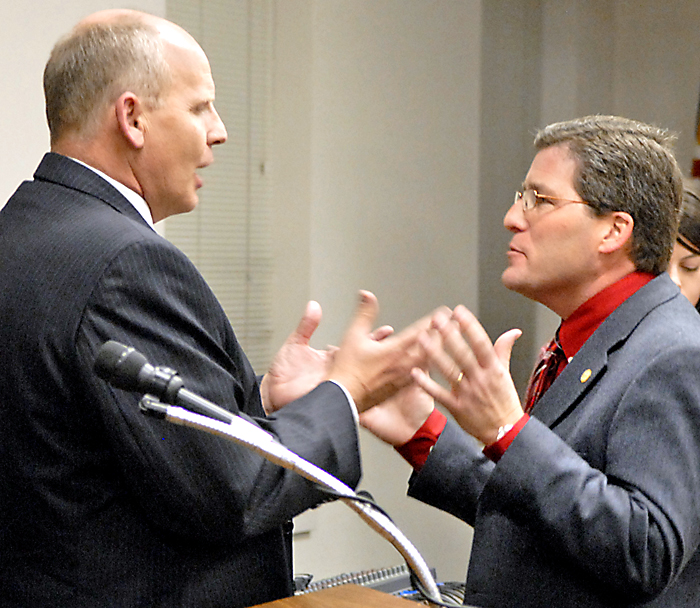Hamilton: Commission, school board reach no decision on PILOT money
Tuesday, February 15, 2011
Hamilton County commissioners and school board members battling for control of $6 million sit down together for the first time on the evening of Valentine's Day.
A board member passes out heart pencils and tin-foil chocolates.
Cue laugh track.
Few present missed the irony, but there was little love shared during Monday night's joint meeting of the Hamilton County Board of Education and the Hamilton County Commission.
After two-and-a-half hours of posturing, interrupting and accusing, the question that prompted the meeting - which elected body will get control of about $6 million in payment-in-lieu-of-taxes money generated for schools - was left unanswered.
"I think we did good. I think we did real good," said Commissioner Joe Graham, whose resolution that the county approved several weeks ago by an 8-1 vote, placed the PILOT money in a holding account until further action is taken. The money would be used for school construction.
When asked when the board and commission would come to an agreement about who would spend the PILOT money, Graham responded, "Don't know, it takes more meetings."
For the first hour of the meeting, Hamilton County Schools' Superintendent Jim Scales and Chief Financial Officer Tommy Kranz gave presentations on the way the school system is using its federal grant money, and on its $313 million general purpose budget.
Kranz talked about the need for increased resources to address a growing student body, many of whom are low-income and learning English. He talked about the 625,000 square feet of buildings the school system has gained in the past several years, which have added $7.5 million in yearly operating expenses.
There are 633 jobs that are paid for with local money, because those jobs are over and beyond what the state provides for with Basic Education Program funds; that adds an additional $37 million, Kranz said.
The school system's biggest issue is a funding gap where the district's expenses consistently outpace its revenues, Kranz said.
"All of these budget decisions are based on the assumption that we were getting the PILOT money. If not, then the administration at this time has to make some drastic, drastic decisions," he said. "There isn't enough money in fund balance to meet these cuts. ... When you take the PILOT money out of the equation, instead of addressing the shortfall in [fiscal year] 2013, we're addressing the shortfall in [fiscal year] 2012."
Kranz said if the district is not allowed to use the PILOT money for operating expenses, it will face a $7 million projected budget deficit in fiscal year 2012.
After listening to the presentation, Graham, who is in the printing business, began to question the school system's spending. He started with the 49 printed pages of Scales' and Kranz's presentations that were handed out to everyone who attended the meeting.
"That paper and that ink is expensive. That's a huge way you can save money. That's the point of the PILOT money; that wasteful spending is what the PILOT money is about. ... How much [of the budget] goes to schools?" Graham asked.
"Ninety-one percent is going to the schools," Kranz answered.
"Well, that's what it says," Graham said, in a lower tone.
"Well, sir, those numbers are audited. ... That's a number that's been signed off on by a lot of regulatory agencies," Kranz said. "As a result of prudently managing our funds, we've not had to borrow one penny from the county government."
Later Commissioner Tim Boyd suggested the school system cut 20 percent, or $6 million from its central office budget.
School board member Jeffrey Wilson said he was disheartened by Monday's meeting.
"[The school board] is doing a good job. We're well aware of some of the dynamics we face," he said. "There has to be some respect. It's not just saying you respect someone. It's showing you respect them. As a board, we have not been respected."
Gail Chuy, principal of Red Bank High School and president of the Hamilton County Principal's Association, also spoke at the meeting, urging commissioners to consider the consequences of not allowing the school system to use the PILOT money for operating expenses.
For the past several years, schools have made significant cuts while standards have gotten tougher, she said. The results have been fewer class offerings, larger class sizes and fewer Advanced Placement, vocational and fine arts classes.
Her statements received a round of applause from the room, which was packed with principals on hand to show support.
In the end, Graham said he didn't realize he was coming across as adversarial, and apologized if he had.
"First and foremost, what you need to remember about this resolution, this is the school's money," he said. "This money still belongs to the children."

